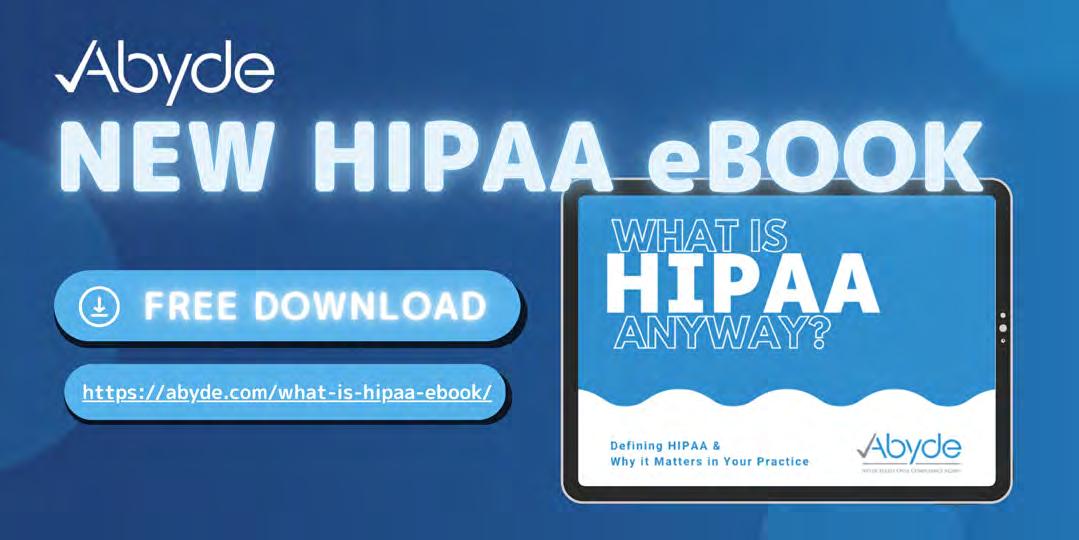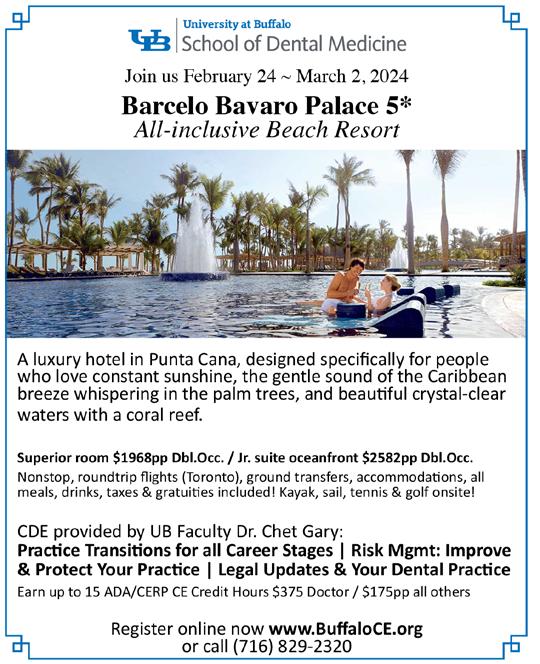
9 minute read
Attorney on Law
The Future of Covenants Not to Compete
Three-pronged attack may bring an end to longstanding legal tradition in New York State.
Lance Plunkett, J.D., LL.M.
Times have changed. In December 1994, I devoted my column to the value of covenants not to compete (“Value of Covenants Not to Compete”). Now, almost 30 years later, covenants not to compete (also called “noncompete agreements”) seem likely to expire as a legal tool. Why and how?
The how part is three-pronged. Prong one is New York State. While some states had already restricted or banned the use of noncompete agreements, many had not. New York was a strong supporter of noncompete agreements. Dentistry originated the first New York State Court of Appeals decision upholding noncompete agreements in Karpinski v. Ingrasci in 1971. The facts of the case are worth noting.
The plaintiff, Dr. Karpinski, an oral surgeon, opened an office in the city of Ithaca and executed a contract for three years with the defendant, Dr. Ingrasci, also an oral surgeon, which recited that the defendant would live in Ithaca and work there as an employee of the plaintiff. The defendant promised that, “while this agreement is in effect and forever thereafter, he will never practice dentistry and/or Oral Surgery in Cayuga, Cortland, Seneca, Tompkins or Ontario counties except: (a) In association with the [plaintiff] or (b) If the [plaintiff] terminates the agreement and employs Another oral surgeon.”
In addition, the defendant agreed to execute a $40,000 promissory note to the plaintiff, to become payable if the defendant left the plaintiff and practiced “dentistry and/or Oral Surgery” in the five enumerated counties. When, after the contract expired, the defendant left the plaintiff’s employ and opened his own office for the practice of oral surgery in Ithaca, he violated the terms of the covenant.
The Court concluded that: 1) the area restriction imposed was reasonable; 2) the covenant was not invalid because it was unlimited as to time; 3) the restriction against the practice of “dentistry and/or Oral Surgery” in competition with the plaintiff was too broad where the plaintiff practiced only “oral surgery”; 4) that the plaintiff gained all the injunctive protection to which he was entitled if effect was given only to that part of the covenant which prohibited the defendant from practicing oral surgery; 5) the injunctive relief was not precluded by the fact that the defendant’s promissory note for $40,000 was to become payable if he breached the agreement not to compete; and 6) instead of awarding the amount of liquidated damages specified, the matter should be remitted for determination of the actual damages suffered during the period of the breach.
Undoing 50-year Tradition
This seminal, baseline case for noncompete agreements in New York has defined how New York courts have looked at noncompete agreements for 52 years. It illustrated all the factors that New York weighed when assessing the validity and enforceability of such noncompete agreements. Interestingly, the New York State Legislature never ventured into this area to change any of the analysis set forth in the Karpinski v. Ingrasci case. Until now. On June 20, the New York State Legislature passed A.1278-B (Joyner)/S.3100-A (Ryan), a bill that adds a new Section 191-d to the New York State Labor Law that would ban all noncompete agreements in New York, but would do so prospectively, not retroactively.
The bill has not yet been sent to Gov. Hochul for action, and it may be one of those bills that does not get sent to her until much later in the year because it is subject to much behind-the-scenes lobbying over vetoing it, passing it with agreed-on amendments next year, or just passing it as is. For her part, the governor is also probably waiting anxiously to see what will happen with prongs two and three, discussed below. Federal action could preempt New York law and make a mess of figuring those interactions out. The New York law would take effect on the 30th day after it becomes a law.
What does the New York law passed by the Legislature accomplish? The bill covers every type of noncompete agreement and has no exception for noncompete agreements entered into as part of business sale transactions. There is no salary cap, so the New York bill would apply equally to low-wage workers and highly compensated professionals or executives, banning noncompete agreements for all of them. The bill will only apply to agreements entered into after the effective date of the bill if it becomes law, but will also apply if a pre-existing noncompete agreement is modified after the date the law takes effect.

If you are in the midst of negotiating any such agreement now, it is a good idea to use a knowledgeable attorney because you will end up stuck with that version if this legislation is signed by the governor into law. The legislation gives workers a private right of action to sue an employer who seeks, requires, demands or accepts a noncompete agreement from any worker. The civil lawsuit must be brought within two years of the later of the date that: 1) the prohibited noncompete agreement was signed; 2) the worker learned of the prohibited noncompete agreement; 3)the employment or the contractual relationship with the worker is terminated; or 4) the employer takes any step to enforce the noncompete agreement. When all is taken into account, the New York legislation converts New York from a state that was highly supportive of noncompete agreements to a distinctly unfriendly state towards such agreements.
Prongs Two and Three
Prong two we covered in the March Journal (“Caring for Your Employees: The End of Non-Compete Agreements?”).
In that column, I reported on Federal Trade Commission (FTC) proposed regulations which would impose sweeping changes that would ban all noncompete agreements, including rescinding agreements already in existence. The theory was that noncompete agreements were always antitrust law violations and that they should never be tolerated except in the limited context of sales of business transactions.
After inviting public comment on the proposed regulations, the FTC has extended its deadlines for making a final decision and still has not done so. The comments have been extensive and varied, and it is not clear what the FTC will do. If the FTC went ahead with its originally proposed regulations, it would moot New York efforts to be any less restrictive. However, the FTC has not taken final action yet.
Prong three we covered in the June/July Journal (“Three New Actions Enter Legal Landscape: NLRB Not Waiting Around”) It derives from the sudden action of the Office of Counsel of the National Labor Relations Board (NLRB) to issue an opinion holding that noncompete agreements violated the National Labor Relations Act. The NLRB has not yet taken any enforcement action based on that Office of Counsel opinion.
Why Now?
Why all this sudden hatred towards noncompete agreements? That “why” is an even more difficult question than the three-pronged “how” of the methodologies for undoing them. The why for the FTC is a long-abiding suspicion that noncompete agreements are antithetical to the antitrust laws and nowadays, the business reasons for allowing them are receding into insignificance in comparison to the negative effects for employees. The FTC has mainly looked at low-wage earners and it has to be acknowledged that the abuses of employers trying to trap low-wage earners into sticking with low-wage jobs through noncompete agreements has poisoned the atmosphere for even formerly legitimate uses of noncompete agreements.
The why for the NLRB we explored in depth in my June/July column, but it goes beyond even the FTC’s antitrust concerns. The NLRB finds that noncompete agreements impair the right of workers in the labor market. The board’s concern is broader and more generic than that of the FTC. The NLRB believes that noncompete agreements inhibit the rights of employees to act on their own behalf vis-à-vis employers, implicating basic fairness on the job.

This is not the province of antitrust laws, but of basic employment and labor laws. In some ways, this is even harder to deflect than the more scientific economic arguments that underlie the antitrust laws. The NLRB was also definitely focusing on low-wage earners, but its rationale has no true relationship to salary level; it is a broader concern with the ability of anyone to earn any wage. The NLRB is a latecomer to this entire issue and may be an illustration of everyone hopping onto a bandwagon while the hopping on is attractive.
The why for New York is less clear. It certainly is a major departure from previous New York law on the topic. It was also certainly prompted by the FTC’s proposed action. The Legislature noted that noncompete agreements have a negative effect on the labor market and economy of New York State because they prevent workers from seeking employment at entities that may be a better fit, and they disincentivize employers from providing more competitive benefits and wages because their workforce cannot seek employment elsewhere.
The Legislature also noted that, in certain industries, noncompete agreements can have a detrimental impact on consumers. In particular, the Legislature cited the prevalence of noncompete agreements in the medical field as disrupting continuity of care. We will not know until later this year where New York will come down on this, and it may well be moot if the FTC comes down with its regulations sooner and if the NLRB acts quickly on its own enforcement actions.
The points made way back in 1971 in Karpinski v. Ingrasci and in my 1994 Journal article are still valid, but times have changed. The allure and utility of noncompete agreements is now under fire as serving more nefarious goals. To quote the old Cole Porter song: “Times have changed, And we’ve often rewound the clock, Since the Puritans got a shock, When they landed on Plymouth Rock. If today, Any shock they should try to stem, ‘Stead of landing on Plymouth Rock, Plymouth Rock would land on them.”
The material contained in this column is informational only and does not constitute legal advice. For specific questions, dentists should contact their own attorney.











